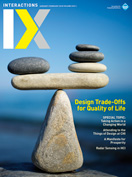Authors:
Loren Terveen
One of the major commitments of the current SIGCHI Executive Committee is to sustain and grow the HCI community. My previous columns have addressed many initiatives designed to serve this goal: global development and community integration (January–February 2016); ensuring our publications are widely available (May–June 2016); supporting our sponsored conferences (September–October 2017); growing the volunteer base (January—February 2017); and supporting freedom of movement and open exchange of information (May–June 2017).
We recently created a new initiative to empower HCI communities around the world and offer development opportunities for students: funding for HCI Summer/Winter Schools (https://sigchi.org/2017/01/wintersummer-schools-in-2017/). School organizers submit funding proposals on topics of their choice, and the support we offer (up to $12,000) is used to cover costs for student participants and (as appropriate) speakers. These schools feature programs of lectures, tutorials, and hands-on activities to introduce students to fundamental and cutting-edge HCI topics and methods.
Thus far we have funded eight schools through this initiative, as well as one through the conference development fund:
- Computational Fabrication and Smart Matter (USA; June 2017)
- Computational Interaction (Switzerland; June 2017)
- User-Centered Design of e-Health and m-Health Systems (Ireland; June 2017)
- Methods in Human-Computer Interaction (Poland; July 2017)
- The Future of Crowdsourcing in Developing Countries—Technical, Design, Social, and Ethical Implications (China; July 2017)
- Recommender Systems (Italy; August 2017)
- Pervasive Computing Interaction for Binational Challenges (Mexico; September 2017)
- Playful Interaction (Australia; November 2017)
- Next-generation Location-based Technologies: From Urban Crowdsourcing to the Physical Web (Argentina; December 2017)
To find out more about each of these schools, you can follow the links from https://sigchi.org/2017/01/wintersummer-schools-in-2017/. But let me give you an overview of what we find so exciting:
- Within a single year, we empowered nine groups of HCI researchers and practitioners from several dozen countries to share their expertise on a wide variety of topics and methods of their choice. This is consistent with our goal of supporting the volunteers who make our community work.
- The nine summer schools took place in nine different countries on four continents. Several hundred students from around the world participated, building new knowledge, skills, and social connections. This is consistent with our goals of global HCI development and integration.
We recently created a new initiative to empower HCI communities around the world and offer development opportunities for students.
The Summer/Winter Schools are just one of the funding initiatives that serve these goals. We encourage all SIGCHI members to consider taking advantage of these opportunities to create their own innovative and impactful events. For specifics, see https://sigchi.org/get-involved/funding/.
Loren Terveen, President, ACM SIGCHI [email protected]
Copyright held by author
The Digital Library is published by the Association for Computing Machinery. Copyright © 2018 ACM, Inc.








Post Comment
No Comments Found